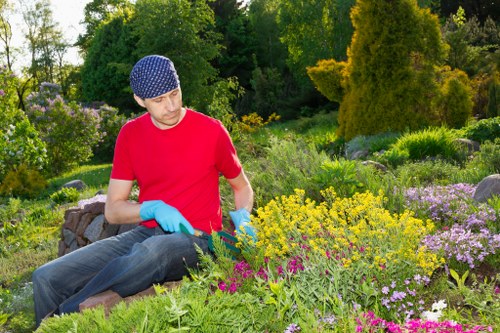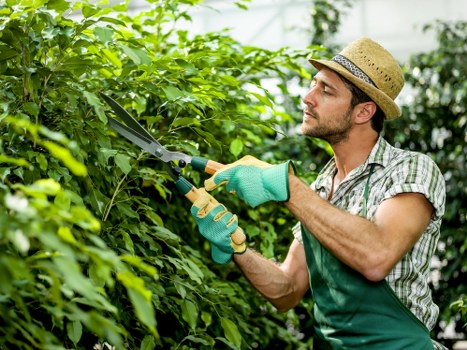Driveway Algae Removal Wanstead: Keep Your Driveway Clean and Safe

Understanding Algae Growth on Driveways
Algae growth on driveways is a common issue, especially in damp and shaded areas like Wanstead. Algae can make your driveway slippery and unsightly, posing safety risks to your family and visitors.
Algae thrive in environments where moisture and shade are abundant. Driveways made of porous materials like concrete and asphalt are particularly susceptible to algal growth.
Ignoring algae can lead to more serious problems, such as surface degradation and increased maintenance costs over time.

Why Algae Removal is Important
Removing algae from your driveway is not just about aesthetics; it's also about safety. Algae make surfaces slippery, increasing the risk of falls and accidents.
Moreover, algae can cause long-term damage to the driveway material, leading to cracks and erosion. Regular maintenance helps preserve the integrity of your driveway.
Professional algae removal services can effectively eliminate the problem and prevent future growth, ensuring your driveway remains safe and attractive.

Effective Algae Removal Methods
Chemical Treatments
Chemical treatments are a popular method for removing algae. These solutions break down the algae, making it easier to wash away.
Pros:
- Quick and effective
- Best for severe algae growth
Cons:
- May harm surrounding plants
- Requires careful handling

Pressure Washing
Pressure washing uses high-pressure water jets to remove algae and other debris from your driveway. It's a straightforward and efficient method.
Pros:
- Eco-friendly
- Effective for light to moderate algae
Cons:
- May not remove deep-seated algae
- Requires professional equipment

Eco-Friendly Solutions
For those concerned about the environment, eco-friendly algae removal methods are available. These often involve natural substances like vinegar or baking soda.
Pros:
- Safe for plants and pets
- Non-toxic
Cons:
- May require multiple applications
- Less effective on heavy growth

Preventing Future Algae Growth
Preventing algae growth is easier than removing it. Here are some tips to keep your driveway algae-free:
Improve Drainage
Ensure that water does not pool on your driveway. Proper drainage reduces moisture, making it harder for algae to thrive.
Increase Sunlight Exposure
Trim overhanging branches and shrubs to allow more sunlight to reach your driveway. Algae prefer shady, damp conditions.
Regular Cleaning
Regularly clean your driveway to remove dirt and organic matter that can support algae growth.

Choosing the Right Algae Removal Service in Wanstead
Selecting a professional algae removal service ensures effective and lasting results. Here's what to look for:
Experience and Expertise
Choose a service with a proven track record in algae removal. Experienced professionals understand the best techniques and treatments.
Customer Reviews
Check reviews and testimonials to gauge the quality of service. Satisfied customers are a good indicator of reliable service.
Environmental Considerations
If you're eco-conscious, look for services that offer environmentally friendly removal methods.

Local Expertise in Wanstead
Wanstead residents benefit from local expertise in algae removal. Local professionals understand the specific climate and conditions that contribute to algae growth in the area.
They can tailor their services to effectively address the unique challenges faced by homeowners in Wanstead, ensuring optimal results.
Customized Solutions
Local services often provide customized solutions based on the specific needs of your driveway, ensuring a more effective cleanup.

Nearby Areas to Wanstead for Algae Removal Services
If you're in Wanstead or its surrounding areas, here are some nearby locations that also benefit from professional algae removal services:
- Balham – Just 2 miles from Wanstead, known for its vibrant community and lush greenery.
- Stratford – A major hub with excellent access to professional driveway cleaning services.
- Chingford – Offers a range of eco-friendly algae removal options.
- Woodford – Known for its quiet residential streets, ideal for regular driveway maintenance.
- Leyton – Close to Wanstead, providing quick and efficient algae removal solutions.
- Forest Gate – Offers specialized services for large driveways and commercial properties.
- South Woodford – Residential area with a high demand for driveway upkeep.
- Highams Park – Combines community spirit with quality maintenance services.
- Wanstead Flats – Proximity to green spaces ensures thorough and effective cleaning.
- Upper Walthamstow – Balances traditional charm with modern cleaning techniques.
- Redbridge – A diverse area with a variety of service providers for algae removal.
- Buckhurst Hill – Suburban area with access to top-rated driveway cleaning professionals.
- Loughton – Offers comprehensive algae removal services tailored to local needs.
- Wanstead Park – Maintains beautiful driveways through regular professional maintenance.

Maintaining a Clean Driveway
Regular maintenance is key to preventing algae growth and keeping your driveway in top condition.
Routine Inspections
Periodically inspect your driveway for signs of algae or other issues. Early detection can save time and money in the long run.
Sealing the Driveway
Sealing your driveway can prevent moisture from penetrating the surface, reducing the chances of algae growth.
Proper Ventilation
Ensure that your driveway has adequate ventilation to keep it dry and less hospitable to algae.

Benefits of Professional Algae Removal
Hiring professionals for algae removal offers numerous benefits:
- Efficiency: Professionals have the right tools and expertise to remove algae quickly.
- Cost-Effective: Prevents long-term damage, saving you money on repairs.
- Safety: Ensures that your driveway is safe for use, reducing slip hazards.
- Aesthetic Appeal: Enhances the overall look of your property.
Long-Term Solutions
Beyond immediate removal, professionals can offer solutions to prevent future algae growth, ensuring lasting cleanliness.

Choosing the Right Treatment for Your Driveway
The best algae removal method depends on the severity of the growth and the type of driveway you have.
Assessing the Severity
Light algae can often be managed with eco-friendly solutions, while heavy infestations may require chemical treatments or pressure washing.
Driveway Material
Different driveway materials respond better to specific cleaning methods. Professionals can recommend the best approach based on your driveway’s composition.

Eco-Friendly Algae Removal Options
For environmentally conscious homeowners, eco-friendly algae removal is a great choice. These methods minimize the impact on surrounding plants and wildlife.
Natural Cleaners
Using vinegar, baking soda, or other natural cleaners can effectively remove algae without harmful chemicals.
Biodegradable Solutions
Biodegradable algae removers break down naturally, reducing environmental footprint while keeping your driveway clean.

Cost of Algae Removal Services
The cost of professional algae removal varies based on several factors, including driveway size, the severity of algae growth, and the chosen cleaning method.
Budgeting for Maintenance
Regular maintenance can help manage costs by preventing extensive damage and reducing the need for expensive treatments.
Comparing Services
Compare quotes from different service providers to find the best value for your budget without compromising on quality.

DIY vs. Professional Algae Removal
While DIY methods can be effective for minor algae issues, professional services offer comprehensive solutions for more severe problems.
DIY Methods
Simple cleaning with eco-friendly solutions can be done at home, but may not be sufficient for heavy algae growth.
Professional Services
Professionals bring expertise, specialized equipment, and effective treatments that achieve better and longer-lasting results.
Making the Right Choice
Consider the extent of your driveway's algae problems and your budget when deciding between DIY and professional services.

Seasonal Considerations for Algae Removal
Different seasons affect algae growth differently. Understanding these patterns can help you plan effective maintenance schedules.
Spring and Summer
Warm and wet conditions in spring and summer promote rapid algae growth, making these seasons ideal for preventive treatments.
Autumn and Winter
While growth slows, it's still important to clean and seal your driveway before the colder months to prevent damage.
Year-Round Care
Maintaining consistent care throughout the year ensures that algae do not establish a strong foothold on your driveway.

Common Myths About Algae Removal
There are several misconceptions about algae removal that can hinder effective maintenance.
Myth 1: Algae is Harmless
Contrary to belief, algae can pose safety risks and cause damage to driveway surfaces if left untreated.
Myth 2: DIY is Always Cheaper
While DIY methods may seem cost-effective initially, they often require more time and may not fully eliminate the problem, leading to higher costs in the long run.
Myth 3: All Algae Removal Methods are the Same
Different algae removal methods offer varied levels of effectiveness and environmental impact. It's important to choose the right method for your specific needs.

Ensuring Longevity of Your Driveway
Maintaining a clean driveway extends its lifespan and keeps it looking new for years.
Regular Cleaning Schedule
Establish a cleaning schedule that includes routine inspections and periodic algae removal to maintain cleanliness.
Protective Coatings
Applying protective coatings can shield your driveway from moisture and algae, reducing the frequency of cleaning needed.
Professional Inspections
Periodic professional inspections can identify potential issues early, allowing for prompt intervention and maintenance.

Conclusion
Driveway algae removal in Wanstead is essential for maintaining the safety and appearance of your property. Whether you choose DIY methods or professional services, regular maintenance and preventive measures play a crucial role in managing algae growth.
By understanding the causes of algae and implementing effective removal and prevention strategies, you can ensure that your driveway remains clean, safe, and visually appealing throughout the year.

Frequently Asked Questions
1. How often should I clean my driveway to prevent algae growth?
It's recommended to clean your driveway at least twice a year, preferably in the spring and autumn, to prevent algae growth and maintain its condition.
2. Are there eco-friendly options for algae removal?
Yes, there are several eco-friendly algae removal methods that use natural substances like vinegar or baking soda, which are safe for the environment and surrounding plants.
3. Can algae damage the surface of my driveway?
Yes, persistent algae growth can lead to surface degradation, causing cracks and erosion over time if not properly addressed.
4. Is pressure washing safe for all types of driveways?
Pressure washing is generally safe for most driveway types, but it's important to use the correct pressure setting and technique to avoid damaging the surface.
5. When is the best time to hire a professional for algae removal?
The best time to hire a professional is during the spring or early summer when algae growth is most prevalent, allowing for timely and effective removal.


